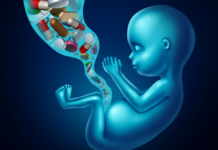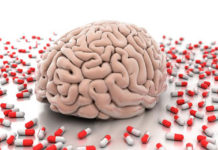Benzos Alter Fish Behavior
Drugs that pass into the water supply can alter the behavior of fish, according to a paper published today in Science magazine. Experiments using...
Antipsychotic Drugs and Relapse
Researchers from Germany, Greece and the U.S. reviewed the literature on relapse at 7 to 12 months following initiation of antipsychotic treatment. They conclude...
Children Diagnosed with ADHD Younger are More Likely to get Multiple Medications
New research demonstrates that children diagnosed with ADHD at younger ages are more likely than those diagnosed later to receive multiple medications within five years of their diagnosis.
Maternal Antidepressant Use Tied to Autism
In a major study, published yesterday in JAMA Pediatrics, the use of SSRI antidepressants during pregnancy was found to increase the risk of autism spectrum disorder (ASD) by 87-percent. Previous studies reveal that more than 13-percent of women currently use SSRI antidepressants during pregnancy.
Long-term Safety of ADHD Drugs Has Never Been Studied
Even though about 10% of American children have been diagnosed with ADHD and most are taking stimulant medications for it, Boston Children’s Hospital researchers...
Sexual Dysfunction from Antipsychotics Common — But Poorly Monitored by Physicians
Describing the prevalence and management of adverse effects from antipsychotics as "a neglected area" of study, a team of researchers from the UK has published a systematic review in the Journal of Psychopharmacology. They aimed to identify the prevalence of, and management strategies for nine categories of adverse effects, including sedation, weight gain, metabolic syndrome, sexual dysfunction and cardiovascular effects.
Greater Exposure to Antipsychotics Associated with Worse Long-Term Outcomes
A new study finds adverse long-term consequences associated with the increased use of antipsychotics in first-episode psychosis.
Poor and Foster Care Children More Likely to be Diagnosed and Treated with Psychiatric...
Study details Medicaid-insured birth cohort’s exposure to psychiatric medications and mental health services.
Antipsychotic Use in Nursing Homes Causing Many Adverse Effects in Elderly
A literature review found that the extensive off-label use of antipsychotic medications in nursing homes is causing many adverse effects and providing limited benefits.
Antidepressant Use Linked to Dementia
A new study finds that elderly individuals using antidepressants are at significantly higher risk for dementia compared to depressed individuals who did not take the drugs.
Antipsychotic Dose Reduction Linked To Long-term Improvements In First-Episode Schizophrenia Patients
Careful reductions in dosage levels of antipsychotic medications over time improved long-term rates of recovery and functional remission in patients diagnosed with a first-episode psychosis.
Antidepressants Worsen Rapid Cycling in Bipolar Depression
-SSRI antidepressant medications contribute to a significant worsening of emotional "rapid cycling" in patients diagnosed with bipolar disorder.
Antidepressants in Pregnancy: Risks to the Fetus and Long-term Health of the Child
The research literature reveals that antidepressant use in pregnancy poses considerable risks to the fetus and the long-term health of the child. These risks include preterm birth, birth defects, abnormal brain development, and behavioral abnormalities in early childhood.
Over 1/2 of Autistic Children take Psychotropics
"... Absence of clear practice guidelines for psychotropic medication use in children with ASD" leads to a range of drugs for depression, anxiety, psychosis...
New Research Suggests Brain Abnormalities in ‘Schizophrenia’ May Result From Antipsychotics
Study finds that reduced cortical thickness and brain surface area associated with 'schizophrenia' may result from antipsychotic drug use.
An FDA Whistleblower’s Documents: Commerce, Corruption, and Death
In 2008, a reviewer of psychiatric drugs at the FDA, Ron Kavanagh, complained to Congress that the FDA was approving a new antipsychotic that was ineffective and yet had adverse effects that increased the risk of death. Twelve years later, a review of the whistleblower documents reveal an FDA approval process that can lead to the marketing of drugs sure to harm public health.
Adding Antipsychotics Worsens Outcomes in Psychotic Depression
Outcomes were worse for all, with young people on combination therapy twice as likely to experience rehospitalization or death by suicide than those on antidepressants alone.
Therapy Better than Antidepressants for Staying Employed
Examining the link between depression and loss of employment, a study by American researchers in the British Journal of Psychiatry found that cognitive therapy...
Family Economic Context Linked to Adolescents’ Antipsychotic Use
In a study of the Swedish Medical Birth Registry published in the British Medical Journal, researchers identified all 324,510 single children born between 1988...
Less-impaired Youth Using Antipsychotics with Other Medications More Often
Use of second-generation antipsychotics (SGA) alongside other medications is growing rapidly among youth who are less impaired, according to a study published online in...
Antipsychotics Lead to Worse Outcomes in First-Episode Psychosis
Those who did not get antipsychotics in the first month were almost twice as likely to be in recovery after five years.
Differentiation of SSRI and Benzo Dependence/Withdrawal “Not Rational”
Researchers from the Cochrane Center and University of Copenhagen in Denmark, publishing in the May issue of Addiction, "explore the rationale for claiming that...
Glucose Metabolism “Derangements” from Second Generation Antipsychotics Clarified
New Zealand and Chinese investigators believe they have clarified the mechanisms by which second generation antipsychotics cause serious "derangements" in glucose metabolism in the...
Negative Antidepressant Trials Still Unlikely to Be Published
Antidepressant trials with negative results are still more likely than not to either be misleadingly spun as positive or unpublished.
Cognitive Impairment from Long-Term Benzodiazepine Use Remains Even After Drug Withdrawal
Long-term benzodiazepine use shown to effect cognitive function during current use and for years after drug discontinuation.




















